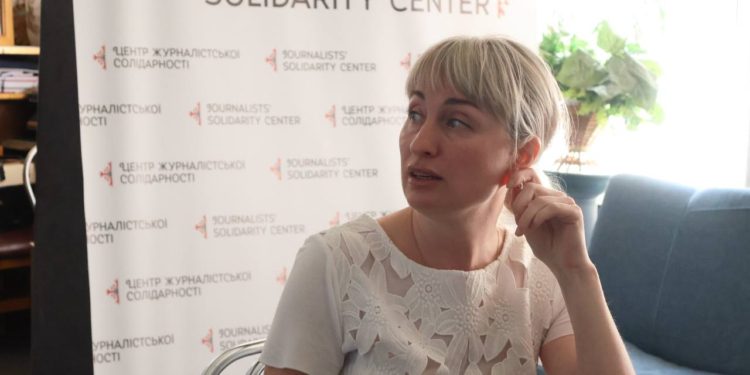A chronicle of pain, resilience and incredible faith in the power of words – this was the story of the editor-in-chief of the legendary publication, Holos Huliaipillia, Tetiana Velyka, during a meeting with colleagues at the Zaporizhzhia Journalists’ Solidarity Center (JSC) of the National Union of Journalists of Ukraine (NUJU).
Newspapers, which, before February 24, 2022, had been fighting for every reader in the conditions of digital competition, lost the most important thing with the start of hostilities – the opportunity to speak out loud. The information industry, in particular print media, suffered a powerful blow after the russian invasion of Ukraine. For newspapers, the war became not just a challenge, but a matter of survival. Many newsrooms found themselves under occupation, under shelling, without electricity, without printing houses… But despite everything, they did not fall silent. One such story is the revival of the Holos Huliaipillia newspaper.
“We are a relocated publication from the city of Huliaipillia. After the occupation offensive, we had to leave, but we did not break down,” says Tetiana. “Before the war, we worked in our hometown. The newspaper was published for over nine decades. In 95 years, it has been silent only three times – during World War II, in the 60s due to administrative reform, and now, due to the russian invasion.”
A total of 586 days of silence… 586 days without a word, without news, without connection with their native land for thousands of residents of three communities. And now, on October 3, 2023, the newspaper came to life again. Not as a business. Not as a product. But as a symbol of invincibility.
“We survived the evacuation, lost our office, and part of the team. But we were able to get together again. Thanks to the support of the National Union of Journalists of Ukraine, its President Sergiy Tomilenko, international partners, heads of the Zaporizhzhia regional organization of the NUJU, and simply caring people,” says Tetiana Velyka.
Currently, the newsroom works in partnership with the Yevhen Korosteliov Charitable Foundation. The most important material of the first revived issue, Zaporizhzhia colleagues call the story of three activists from Huliaipillia, who were the first to die last March, when the occupiers tried to enter Huliaipillia.
Tetiana also told her colleagues touching stories from the first days of the war – tragedies, losses, feats of ordinary people who became extraordinary. Their stories – on the pages of the newspaper, in photos, in drone videos, in lines that make the heart ache. This is not just journalism – it is documentation of history that is happening here and now.
The newsroom has resumed work not only in paper format. The newspaper has a website, a Telegram channel, and a Facebook page. Today it is created by four journalists, all of whom are internally displaced people, who themselves lost their homes. But not their faith.
“Since January 1, 2024, we have become a regional publication. We are published twice a month, and we can be found in all Ukrposhta branches in the region. But to stay afloat, we need support. Advertisers have disappeared. Readers are forced to save money. We fight every day to keep the newspaper alive,” emphasizes the editor-in-chief.
Holos Huliaipillia has already become a participant in several international projects: the information project “Close To Zero Line: Life Of Front-Line Communities” with the involvement of local print media from front-line and de-occupied territories, which was initiated by the NUJU with the support of international partners Free Press Unlimited; then the Scholarship Project for Ukrainian Journalists and Media from the Laboratory of Public Interest Journalism with the support of the European Centre for Press and Media Freedom (ECPMF) on the recommendation of NUJU and the Academy of Ukrainian Press. Currently, the newsroom receives institutional support from the Association of Independent Regional Publishers of Ukraine (AIRPU).
The team plans to develop video content, analytics, and expand the audience. But the most important thing is to continue writing about those who remained, who hold the rear and the front, and who build a new life from the ruins of the old.
The war changed everything. But it did not destroy the most important thing — a person’s need to know the truth, stay in touch with their loved ones, and hear a living word that warms them. The fate of Holos Huliaipillia is an example of the resilience of Ukrainian journalism. This is proof that even under shelling, in evacuation, among losses, the word can survive. And it has power, and journalists are important!
The network of Journalists’ Solidarity Centers is an initiative of the National Union of Journalists of Ukraine, implemented in collaboration with the International and European Federations of Journalists and UNESCO, and with the support of the People of Japan. Our primary goal is to assist media professionals working in Ukraine during the war. The Centers are active in Kyiv, Kharkiv, Zaporizhzhia, Dnipro, Lviv, and Ivano-Frankivsk. The project is part of UNESCO’s broader efforts to support the Safety of Journalists and Freedom of Expression in Ukraine.
Call the Zaporizhzhia JSC at 096 277 5352 (Nataliya Kuzmenko and Valentyna Manzhura, coordinators of the Zaporizhzhia JSC). The Center’s address is 15 Sobornyi Avenue.
Tamara Bort
Photo by Dariya Zyrianova

 THE NATIONAL UNION OF
JOURNALISTS OF UKRAINE
THE NATIONAL UNION OF
JOURNALISTS OF UKRAINE
















Discussion about this post